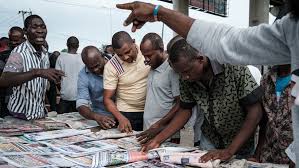The projection of eight weeks by MainOne, the Digital Infrastructure Service Provider, for the repair of the recently damaged subsea cables that disrupted Internet connectivity in Nigeria and some other West African countries is one of the trending stories in Nigerian newspapers on Tuesday.
The Guardian newspaper reports that MainOne, a Digital Infrastructure Service Provider, has revealed that repairing the recently damaged subsea cables that disrupted Internet connectivity in Nigeria and some other West African countries will take up to eight weeks.
Recall that there was an internet outage on multiple network services on March 14, disrupting access to internet across major sectors of the country.
The affected undersea cables included the West Africa Cable System (WACS), the Africa Coast to Europe (ACE), MainOne, and SAT3.
This disruption had negatively impacted data and fixed telecom services in several West African countries, notably Nigeria, Ghana, Senegal, and Cote d’Ivoire, extending as far as eastern and southern Africa.
On March 15, the company stated that repairing its undersea submarine cables might take one to two weeks.
However, in a statement released on Monday, MainOne stated that it has restored network access in the region, adding that due to the extent of the cable damage, the repair process would take longer than originally anticipated.
It reads: “MainOne has continued to demonstrate resilience and agility in the face of recent challenges, focused on delivering value to customers and enabling West Africa’s digital ecosystem.
“MainOne has restored services and enabled regional interconnection over the last one week to ensure stability in the digital ecosystem across the region.
“In addition, we are actively working with our maintenance partners, vessel owners and permitting authorities to expedite the repair of our submarine cable.
The newspaper says that the Nigerian National Petroleum Company (NNPC) Ltd has said its gas strategy is set to trigger Nigeria’s industrialisation and economic growth.
NNPC’s Executive Vice President, Upstream, Mrs. Oritsemeyiwa Eyesan, disclosed this during a Panel Session at the 2024 CERAWeek Conference in Houston, the United States.
Eyesan said Nigeria was a predominantly gas-rich country which boasts of over 200TCF of gas that can be leveraged for the country’s industrialisation and economic development.
She noted that NNPC Ltd plans to deepen gas utilization domestically for industrialization and ensuring that the entire country feels and optimizes the use of the resource.
She added that NNPCL is vigorously opening avenues for infrastructural gas development through various gas projects spread across the country.
“Our focus is how do we move from predominantly oil player to gas player and not just for gas for the sake of gas but gas for power generation, and for industrialization, “she stated.
Eyesan observed that the NNPC Ltd is also focused on emission reduction and gas flare-out, adding, “We want to capture all gas flared, utilize it and for domestic use and and ultimately, increase our energy transition footprints”.
The Punch reports that President Bola Tinubu on Monday approved the Renewed Hope Infrastructure Development Fund to bridge the country’s $25bn per annum infrastructure funding gap.
The new initiative will be domiciled in the Presidency, the Minister of Information and National Orientation, Mohammed Idris, told journalists after Monday’s Federal Executive Council meeting at the Presidential Villa, Abuja.
Idris said the fund became necessary given Nigeria’s current infrastructure gap, requiring $878bn to bridge between 2016 and 2040.
“Now, there is a study that was made that said Nigeria will require about $878bn between 2016 and 2040 to bridge its infrastructural deficit.
“What that means is that from 2016 to 2040, about $25bn will be required annually to bridge that infrastructure deficit.
“Therefore, Mr President, in his wisdom and with the approval of the Federal Executive Council, today, approved the setting up of the Renewed Hope Infrastructure Development Fund to be domiciled in the Presidency,” he announced.
Giving further details about the new development, the Chairman of the Federal Inland Revenue Service, Zacch Adedeji, said the fund would focus on road, rail, agriculture, ports and aviation.
He explained that the fund will be launched only after the Minister of Budget and Economic Planning, Abubakar Bagudu, prepares a supplementary budget to accommodate the new spending.
The newspaper says that the Central Bank of Nigeria has disclosed that it will be allocating $10,000 to each Bureau de Change operator at N1,251/$.
This was contained in a circular made available to The PUNCH and signed by the bank’s Director, Trade and Exchange Department, Dr Hassan Mahmud on Monday.
The apex bank directed each BDC to sell the dollars to eligible customers at a rate not exceeding 1.5 per cent above the purchase price, implying the BDCs are not expected to sell above N1,269/$1.
On July 27, 2021, the CBN discontinued the sale of foreign exchange to BDCs, accusing them of trading FX wholesale amounts greater than $5,000, in contravention of their licences, and Nigeria’s FX regulations.
The PUNCH reports that CBN announced its decision to sell foreign exchange worth $20,000 to each eligible Bureau de Change operator across the country in February.
This comes more than two years after the suspended former CBN Governor, Godwin Emefiele, stopped the sales of foreign exchange to BDC operators.
The naira maintained a steady appreciation against the United States dollar on Monday, gaining N14 to close at 1,408/$ at the official market.
The circular read in part, “We refer to our letter to you referenced TED/DIR/CON/GOM/001/071 in respect of the above subject, wherein the CB approved a second tranche of the sale of FX to eligible BDCs.
“We write to inform you of the sale of $10,000 to each BDC at the rate of N1,251/$1. The BDCs are to sell to eligible end users at a spread of not more than 1.5 per cent above the purchase price.”
GIK/APA
Nigeria: Press zooms in on 8-week projection for subsea cable repairs, others

Previous ArticleAngola intensifies fight against tuberculosis

